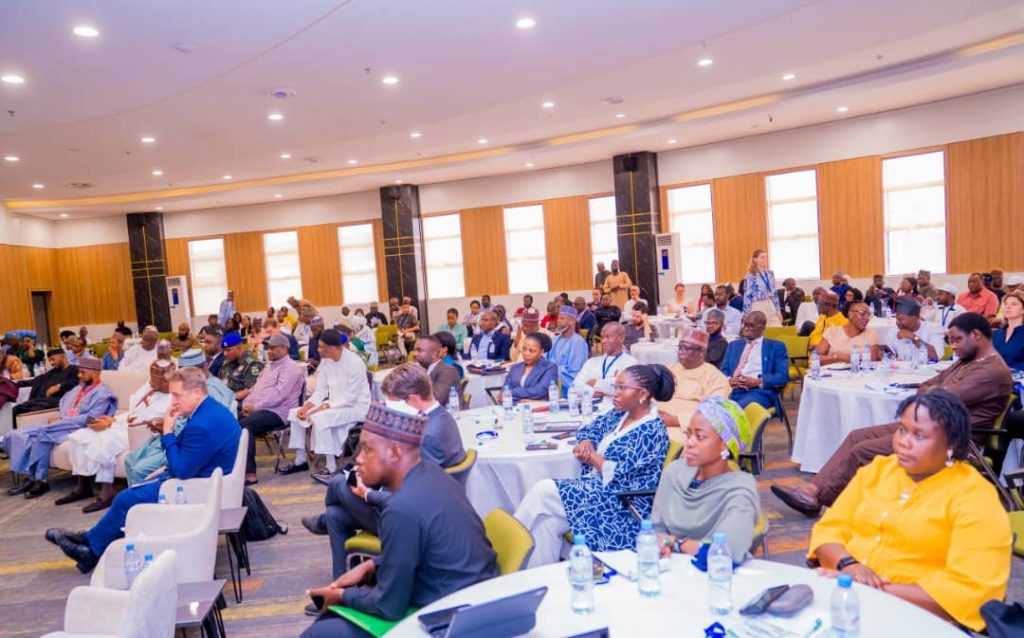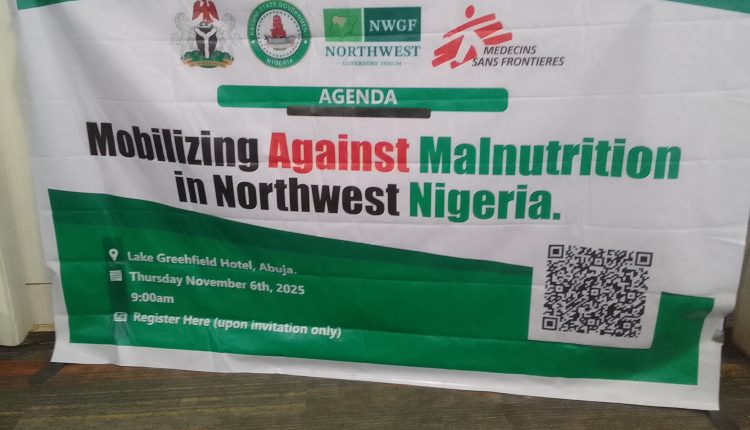|
Getting your Trinity Audio player ready...
|
By Anthony Maliki, Abuja
The conference on “Mobilizing against malnutrition in northwest Nigeria” held in Abuja on 6th November, 2025, was not a talk shop reeling out figures on cases of malnutrition in the region, but a frank discussion on the matter in order to checkmate the “crisis”.
From the Governor of Katsina State, Dr. Umaru Dikko Radda, the Coordinating Minister of Health and Social Welfare, Professor Mohammad Ali Pate, Country Representative of Médecins Sans Frontières (MSF), Dr. Ahmed Aldikhari and panellists among others were on point on the matter of changing the narrative.
Midway through the conference, Governor Radda took time off to attend to the media stressing that the state is not angry with the figures coming out of the state on the poor nutritional status of children.
Without mincing words, the Governor noted: “We are in Abuja today to talk about issues of malnutrition and also to holistically put our heads together to address the situation by looking at the root causes of the problem and also secure partnership, support and collaboration because the government of northwest alone cannot address the issues.
“We need support development partners, NGOs and other government agencies and putting our heads together to mobilise resources. A lot of things have been said and after this conference, find workable solutions to address the issues…The era denial is over and we know the root causes of this malnutrition in the northern part of the country. Some of them are social issues, marital issues, insecurity and hope to holistically look at those challenges and deal with them without any sentiment. That is why called it Northwest Governors’ Conference because we are most affected and we are trying to provide solution,” he said.
However, in his formal address at the conference, Governor Radda, reiterated his administration’s unwavering resolve to confront malnutrition head-on, declaring that the state is moving from “awareness to action. We gather not merely to discuss a problem, but to confront an emergency that threatens the very foundation of our future — our children,” Radda said.
According to him, there are plans to scale up Outpatient Therapeutic Feeding Centres (OTPs) across 12 local government areas of the state, establish Tom-Brown and Ready-to-Use Therapeutic Food (RUTF) production factories in Katsina, and distribute 90,000 bags of grains to vulnerable households.
The Governor also announced that the state is considering the approval of six-month maternity leave and the full implementation of the Child Protection Law, alongside the enactment of a Family Law to curb social factors contributing to malnutrition.
Also, the Vice President, Senator Kashim Shettima, represented by the Senior Special Adviser on Public Health, Mrs. Uju Vanstatia Rochas-Anwukah, declared that “there is no greater test of our humanity than how we respond to hunger in the land,” calling on leaders across all levels of government to make child nutrition a national priority.
He lauded Governor Radda’s proactive leadership in tackling the menace of malnutrition, describing Katsina’s nutrition initiatives as “a model and a timely response to a national tragedy.
“Governor Radda has shown leadership on many fronts. The priority being accorded to nutrition today stands as a model and a timely response to the tragedy of malnutrition we must confront together,” Shettima stated.
The Vice President decried the alarming rate of child malnutrition in the country, explaining it as “a silent crisis that weakens our children, limits our potential, and haunts our collective conscience” noting that the cost of inaction is both human and economic, with Nigeria losing an estimated $56 billion in human capital yearly due to malnutrition.
“When a nation’s children suffer from stunted growth, its future too becomes stunted. Every dollar invested in nutrition yields a return of twenty-three dollars. Nutrition is not a cost; it is the most strategic investment in our nation’s future,” Shettima emphasized.
He reaffirmed the Federal Government’s commitment under President Bola Tinubu to decentralizing nutrition programmes through the Nutrition 774 Initiative, ensuring no community is left behind.

The Vice President also called for solidarity from development partners and the private sector, adding that “nutrition is not charity; it is enlightened self-interest.”
Médecins Sans Frontières (MSF) Country Representative in Nigeria, Dr. Ahmed Aldikhari, painted a gloomy picture of malnourished children stressing that Nigeria has become the country where the organisation treats the largest number of malnourished children in the world.
In 2024 alone, MSF admitted nearly 300,000 children with Severe Acute Malnutrition in its outpatient units across northern Nigeria amounting for more than half of all MSF admissions worldwide.
He attributed the crisis to Nigeria’s demographic weight as Africa’s largest nation and the sixth most populous country globally, coupled with the hunger gap affecting northern Sahelian regions.
The Coordinating Minister of Health and Social Welfare, Professor Mohammad Ali Pate, pointed out that malnutrition remains one of the most pressing challenges confronting Nigeria particularly in the Northwest region, where many children and families continue to struggle with limited access to adequate nutrition.
According to him, 2024 National Demographic Health Survey and recent SMART surveys reveal persistently high rates of wasting and stunting in the Northwest with some states recording Global Acute Malnutrition levels above emergency thresholds.
He said these figures demand urgent and sustained action, because behind these numbers are real families: fathers, uncles, mothers, aunties and caregivers, struggling to feed their children, and communities stretched to their limits.
He noted that while humanitarian interventions have mitigated the worst impacts, the underlying determinants consisting of poverty, food insecurity, weak health systems, and low coverage of preventive services still persist.
But it was not all miserable stories as Katsina State Governor received international commendation and a £10 million pledge from the European Union for his leadership in combating malnutrition in northwest Nigeria by the United Nations (UN) Resident and Humanitarian Coordinator, Mr. Mohamed Malick Fall.
“Thank you, Governor Radda, for convening us today. Your leadership is key. You unlock financing, ensure accountability, and drive action,” Fall said.
The UN coordinator disclosed that over three million Nigerian children under five suffer from severe acute malnutrition, with two million still awaiting life-saving support.
He urged governors across the northwest to release funds, mobilise teams, and support staff in stabilisation centres, stressing that solutions are available and Nigeria already produces nutrition commodities.
Similarly, the EU pledged £10 million and promised to coordinate additional donations from the World Bank, World Food Programme, and international NGOs for Katsina and the entire northwest region.
The Executive Secretary of Katsina Development Management Board, Mustapha Shehu, described the conference as a giant step towards holistic partnership in tackling malnutrition.
He noted that organisations made concrete commitments to support the state in food security, nutrition treatment, and health interventions.
The Director-General, Northwest Governors Forum, Maryam Yahaya, presented stark statistics from the 2024 Northwest Nutrition Survey, revealing that 16.6 per cent of children under five in Sokoto State suffer acute malnutrition, 11.6 per cent in Katsina, and 10.4 per cent in Zamfara.
She disclosed that 2.8 million children across the region need urgent nutrition support, representing a 40 per cent increase in two years.
“In Katsina, half of all children are stunted—too short for their age, too undernourished to learn, too weak to thrive,” she said.
The forum committed to rolling out the Northwest Nutrition Roadmap 2025–2028, a joint plan coordinating states, partners, and data under one framework.
No doubt, though it is a one-day conference, the outcomes are enormous following frank discussions with the future brighter at checkmating or totally eradicating malnutrition in not only the northwest region but Nigeria as a whole.



Comments are closed, but trackbacks and pingbacks are open.